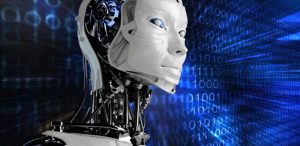
AI, short of Artificial Intelligence, is a super hot topic recently. On the one hand, people want AI to be developed to make life easier; on the other hand, people are worried about AI might rule human some day. Therefore, the development of AI will depends to some extend on whether AI will get the abilities to rule human in the future.
To answer this question, at first, let’s consider what is AI. In computer science, AI is sometimes called machine intelligence. That means, AI is totally unlike human intelligence or animal intelligence. It is created by human, with no life or brain, even no nerve. The intelligence of AI is from some pretty complex programs written by programmers, providing some abilities like human abilities, such as “learning” and “problem solving”. By this way, AI develops a programing “neural network”, which allows AI to collect information – by vision, touch, hearing, or understanding languages – and to make up a solution then turn it into motion or languages or something else.
We’ve already seen how brilliant AI is in learning something existed and calculating the best solution (if available). We use calculator and online translator, which are not too complexly programed, and we never worried about them. However, there was an AI robot showed its amazing intelligence, even better than human. That is AlphaGo developed by a team led by Google’s DeepMind company, Demisham Hasabis. Go, a strategic two-player board game popular in East Asian countries, is considered to be the most complicated board game in the world. From March 2016 to May 2017, AlphaGo competed with dozens of elite professional Go players in China, Japan and Korea, and was no defeat in 60 consecutive  games. It also defeated the World Go Championships in 2016 and 2017 with 3:1 and 3:0 respectively, surpassing the top level of human professional Go.
games. It also defeated the World Go Championships in 2016 and 2017 with 3:1 and 3:0 respectively, surpassing the top level of human professional Go.
People got shocked by AlphaGo, and worried again. However, AlphaGo is still far from programmer’s satisfaction with a perfect AI. They want an AI which is brilliant enough to pass the Turing Test (TT). TT is when the tester (a person) is separated from the testee (a machine), the tester is free to ask the testee questions through some devices (such as a keyboard). After multiple tests, if more than 30% of the testers are unable to determine whether the testee is a human or a machine, then the machine passes the test and is considered to have human intelligence. Till now, there were few AI passing TT, and those passed TT were by cheating but not human intelligence.
In conclusion, there’s no need to worry about being ruled by AI. Although AI is pretty good at learning, it can’t creating. Before we totally understand how our brain works, we can’t make AI get real intelligence. When that day comes, we can still keep a “key word” in the programming of AI, to destroy it any time if it’s out of control.
